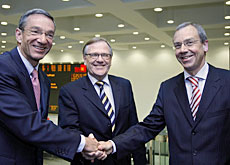Swiss financiers seek to tempt hedge funds

The Swiss finance sector has decided to increase pressure on the authorities to enact reforms that would help attract more hedge fund managers to Switzerland.
With only four out of around 9,500 hedge funds domiciled in the country, the moneymen fear a bonanza is slipping from their grasp. Surprisingly though, these specialists are pointing the finger at the tax and regulatory systems.
Hedge funds are investment vehicles with membership restricted in many cases to very wealthy individuals or organisations with sophisticated market knowledge. This closed membership structure allows the funds to take bigger financial risks in alternative investments with relatively few regulatory restrictions.
They are regarded as one of the most aggressive and successful investors in recent years, pumping billions of dollars into the global financial markets. But some of their more risky strategies have been blamed in some quarters for causing recent stock market instability.
Nevertheless, the Swiss Federal Banking Commission (SFBC) issued a report earlier this week calling for more to be done to attract hedge funds to Switzerland. It believes the strong Swiss financial market is underrepresented compared to New York, London and even Luxembourg.
Switzerland does well from investment vehicles known as funds of funds, which repackage and resell hedge funds, handling about a third ($200 billion or SFr237 billion) of the global business.
But because the hedge fund managers are located outside its borders, Switzerland enjoys less than one per cent of the $1,400 billion (SFr1,661 billion) of wealth they create worldwide.
Tax is key
The SFBC wants Swiss regulations changed to enhance risk management procedures, increase transparency in the hedge fund industry, prevent market manipulation and make it easier for funds to register under its umbrella.
But perhaps the most significant move would be to change the taxation system to allow fund managers to declare profits as a capital gain rather than income, thus reducing their tax bills.
This measure took on increased urgency this summer when the British and US authorities raised questions about the fairness of hedge fund taxation and started to look at more punitive regimes. This has raised the possibility of Switzerland poaching hedge fund managers with a more attractive tax system.
However, Switzerland has yet to pounce on this opportunity according to Pierre Mirabaud, chairman of the Swiss Bankers Association (SBA).
“Switzerland can only take advantage of this [situation] if we lower our tax because even if the rate in the UK is made higher it will still be only half of that in Switzerland,” he told swissinfo.
Wealth up for grabs
The SBA is one of the authors of a master plan, launched on Thursday, to make Switzerland one of the world’s top three finance destinations by 2015.
The strategy paper repeated the banking commission’s calls for reform, predicting they would increase Switzerland’s share of hedge fund managed assets from SFr130 billion to SFr320 billion.
This would add SFr7.6 billion to the nation’s gross domestic product, generate 2,000 new jobs and inject some SFr450 million in taxes in eight years, the report concludes.
“We don’t want hedge funds to be another lost opportunity and we must work very seriously on this now,” said Mirabaud, referring to previous missed chances to capitalise on the foreign exchange and commodities markets.
swissinfo, Matthew Allen in Zurich
Hedge funds first sprang up on Wall Street in the 1940s primarily to invest money for the wealthy.
The financial term “hedging” is making an investment specifically to cancel out or reduce the risk of another investment.
Hedge funds devise complicated strategies to make money by gambling on the direction of markets, currencies and commodities. They also buy shares in companies rumoured to be merging with others.
One hedge fund manager, George Soros, reputedly made hundreds of millions of dollars by betting that the British pound would be ejected from the European Exchange Rate mechanism in 1992.
It is hard to determine the exact number and value of hedge funds as they are secretive in their operations. However, there are an estimated 9,500 funds generating around $1,400 billion of wealth globally.
Two thirds of this wealth is located in the US, mainly New York, with around 20% in London – that has cornered around 90% of the European wealth.

In compliance with the JTI standards
More: SWI swissinfo.ch certified by the Journalism Trust Initiative












You can find an overview of ongoing debates with our journalists here . Please join us!
If you want to start a conversation about a topic raised in this article or want to report factual errors, email us at english@swissinfo.ch.